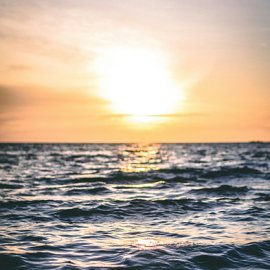What If?
-
English
-
ListenPause
[intro music, ocean sounds]
Welcome to World Ocean Radio…
I’m Peter Neill, Founder of the World Ocean Observatory.
It is summer. We are in a climate gyre of heat, intermittent and intense rain, fog, winds circling the compass, suspension, disruption, in a time when there is no under-lying stability, only unimaginable social change and challenge, not just to weather patterns, but to the basic stability of values, precepts, long-held beliefs turned topsy-turvy, turned unimaginable as ever in my lifetime, turned unexpected, destructive, and mean.
Resilience can take many forms. As a congenital optimist, the old precepts and expectations seem hollow and ineffective. What to do? Where to place energy and imagination as a function of resistance, of rescue through invention? I find myself asking so often now: what if?
What if we use the critical energy of the moment to try something new? What if we focus our limited capacity on another, what I call a “pro-volutionary way,” a collective resolve, forward and through, to an unexpected answer to what has become a bitter stream of constant, oppressing questions. In a search for re-centered criteria for what and how we invest for the future, I said to myself “What if…?” What if we reversed the valence and direction of response from top-down expectation of government as the be-all, end-all vector for solution through subsidy and grant and incentivized investment, an approach that, despite so much progressive initiative, has been suddenly neutralized by counter-ideology and erasure? What if we tried another way?
I reached out to parties in my community actively engaged, but stymied, and depressed by the negative, regressive turn events around us.
“What if,” I wrote, “we reversed our approach, gathered our local resources – our commitment and experience – to declare ourselves a “local climate village,” a community of neighbors with entwined self-interest --- from commerce (fisheries, construction, and services) to education to health to communal welfare and quality of life – to apply our knowledge and other wherewithal from within to without, from bottom to top, designed as an integrated, living expression of successful being together by engagement, empathy, and evident return from each to another, from one to all, with those whom from day-to-day we live.
“What if we take our funds, and build the society in which we want to live in, to be, not as we are steered to be, but as we want to live built on democratic conversation, shared values, and applied investment in the place where we can live while the rest of the world swirls and circles around us? What if we look out to find other villages similarly engaged – sharing knowledge, collectively applying available resources, schooling our children, celebrating our traditions, programming community endeavor, supporting local enterprise, relying on ourselves, and others around us, no longer strangers, to survive, indeed to flourish?
“I often use the phrase “thinking like an island” when trying to express the values, structures, and ultimate behaviors that characterize “island living,” geo-physically constrained, reliant on family, friend, even stranger, on life skills learned and handed down, teachings proven by the consistency of utility over time, by history, by connection in crisis, an offer to help even if you haven’t said a word one to another since yesterday or for generations. What if we became a village of tinkers, many-faceted, competent, and individuals interested in helping each other, no matter who or why, to live peacefully and successfully in time of trial? And then, what if we began to understand that other, adjacent villages were just like us, diverse and particular, one island more in an archipelago of successful community and relation? What if we became an “island of the future,” one of many states within a state surrounded by many states, by mutual interest of other nation states, by a world unified by the re-application of values, professed but forgotten, by peace not war, by sharing, not hoarding, by respect and love not enmity and expulsion of those seemingly different, but in truth, just like us? We are all living as islands. What if such a simple understanding could direct us forward?”
The sad ending to this story is that my queries to those in the community generated little reply. Is it too late? Is there no time left to explore another way of seeing, being, solving, surviving? It was very disappointing. But what if, I thought, again, what if….
We will discuss these things, and more, in future editions of World Ocean Radio.
WORLD OCEAN RADIO IS DISTRIBUTED BY THE PUBLIC RADIO EXCHANGE AND THE PACIFICA NETWORK, FOR USE BY COLLEGE AND COMMUNITY RADIO STATIONS WORLDWIDE. FIND US WHEREVER YOU LISTEN TO PODCASTS, AND AT WORLD OCEAN OBSERVATORY DOT ORG, WHERE THE FULL CATALOG OF MORE THAN 700 RADIO EPISODES IS SEARCHABLE BY THEME.
[outro music, ocean sounds]
This week: Is there no time left to explore other ways of seeing, being, solving, and surviving? Where can we place our energy and imagination to serve as functions of invention? What if there are new ways of thinking about what and how we invest for the future?
About World Ocean Radio
World Ocean Radio is a weekly series of five-minute audio essays available for syndicated use at no cost by college and community radio stations worldwide. Peter Neill, Founder of the World Ocean Observatory and host of World Ocean Radio, provides coverage of a broad spectrum of ocean issues from science and education to advocacy and exemplary projects.
World Ocean Radio
15 Years, 750+ Episodes
Ocean is climate
Climate is ocean
The sea connects all things
- Login to post comments



